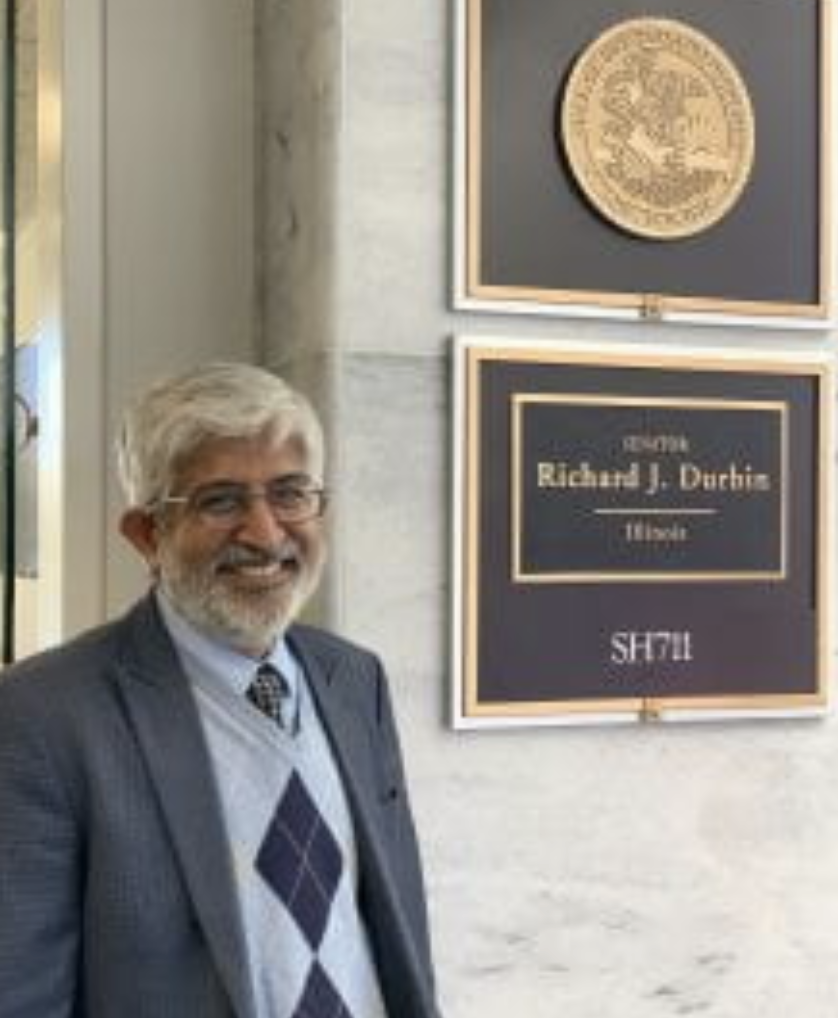Northwestern Part of New DOE Quantum Collaboration
Northwestern University will be a partner institution in a $3.2 million research initiative funded by the U.S. Department of Energy. The effort, in conjunction with Fermilab and others, will develop designs for transparent optical quantum networks and demonstrate their operation in the greater Chicago area. These networks promise to lay the foundation for interconnecting quantum computers — which are actively being developed by many companies — much like classical computers are networked today to form the Internet.
The proposed Illinois-Express Quantum Network (IEQNET) connects nodes at Fermilab and proposed nodes at Northwestern's Chicago and Evanston campuses. The metropolitan-scale network uses a combination of cutting-edge quantum and classical technologies to transmit quantum information and will be designed to coexist with classical networks.
Fermilab is the lead institution for the IEQNET collaboration, which includes Northwestern, the Department of Energy's Argonne National Laboratory, and Caltech.
"Our team brings together researchers who are leading the way in quantum communications, classical networking, quantum devices and fast-timing electronics," said Panagiotis Spentzouris, head of quantum science at Fermilab and the project’s principal investigator. "That marriage of world-class expertise enables us to develop the new network."
Northwestern’s Prem Kumar, professor of electrical and computer engineering and director of the University’s Center for Photonic Communication and Computing, is one of the researchers on the project. "We have leading quantum technology capabilities at our respective institutions. Now we're combining them to create new opportunities for distributed quantum communications," said Kumar, a member of the executive committee at Northwestern’s INQUIRE initiative, a cross-disciplinary knowledge hub that brings together the University’s expertise in quantum-related science.
Quantum communication is a field of applied quantum physics related to quantum information processing. Among its compelling applications is to interlink the upcoming quantum computing hardware to form a quantum network, much like how ordinary computers today are ubiquitously connected to form the Internet. Such communication allows quantum bits — encoded on particles of light called photons — to transmit data using "superposition of photonic states," a strange quality of quantum systems that permits the system to exist in multiple states at the same time.
Scientists have previously demonstrated point-to-point quantum communications over short distances — on the order of 10 miles — in fiber-optic cables. IEQNET’s goal is to demonstrate a multinode fiber-optic quantum network that supports multiple users.
 "We will be using state-of-the-art sources and photodetectors in nodes we have built already at Fermilab, to co-distribute classical and quantum information across Chicagoland," said Caltech scientist Maria Spiropulu, another IEQNET researcher. "We want to identify and address the challenges towards non-trivial, long distance multilayered architectures that support multiple end-users and test various protocols."
"We will be using state-of-the-art sources and photodetectors in nodes we have built already at Fermilab, to co-distribute classical and quantum information across Chicagoland," said Caltech scientist Maria Spiropulu, another IEQNET researcher. "We want to identify and address the challenges towards non-trivial, long distance multilayered architectures that support multiple end-users and test various protocols."
The proposed network stretches between the Chicago-area institutions using existing fiber-optic cables. “We want to utilize existing links because we have significant infrastructure that has already been laid for classical communications,” said Rajkumar Kettimuthu, an Argonne scientist affiliated with IEQNET. “One of the challenges will be to achieve classical and quantum co-existence in the same fibers.”
IEQNET leverages existing conventional infrastructure and experience from ESnet, a high-speed computer network serving DOE scientists and their collaborators worldwide. ESnet is managed by Lawrence Berkeley National Laboratory, also a DOE national lab.
The project also brings together small quantum tech industry partners (NuCrypt, HyperLight) and the Intelligent Quantum Networks and Technologies (INQNET) program, which was developed through a Caltech and AT&T partnership and is a member of the Quantum Economic Development Consortium of the National Institute of Standards and Technology.
By connecting business with academia, IEQNET has the potential to generate new technologies that have wider application in industry, helping elevate the Chicago area as a hot spot for technology transfer in quantum science.
IEQNET’s objective supports the United States in meeting the goals of its National Quantum Initiative, a coordinated multiagency program to support research and training in quantum information science. It also positions Chicago as one of the few places in the nation advancing quantum communications. The proposed network stretches between the Chicago area institutions using existing fiber-optic cables.
“We are on the threshold of a new era in quantum information science and quantum computing and networking, with potentially great promise for science and society,” said DOE’s Under Secretary for Science Paul Dabbar. “These projects will help ensure US leadership in these important new areas of science and technology.”